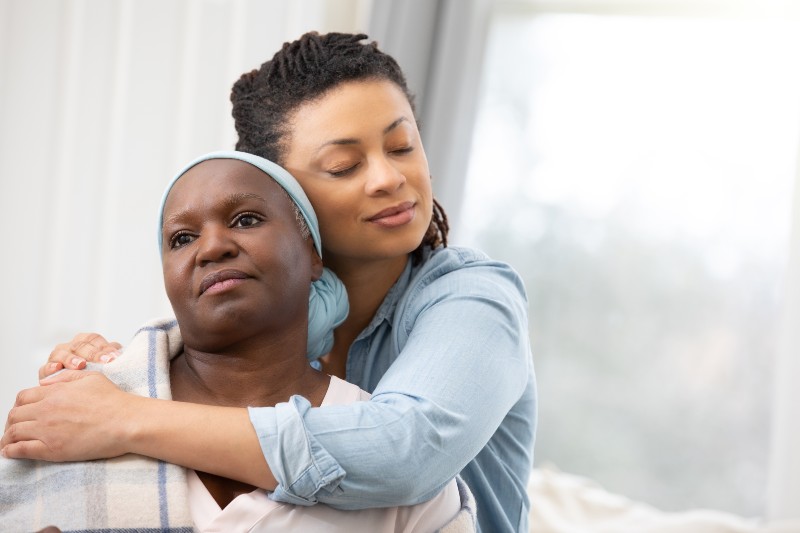Finding out someone you love has cancer is shocking. It’s scary, and your heart aches. You want to do everything in your power to help this person. But how will you be able to do that and manage your own job and other family responsibilities?
“Caregiving may be the most emotionally and physically challenging job you’ve ever had. But it may also be the most rewarding,” says Ilene Stephan, M.D., and Internal Medicine physician in the Riverside Cancer Care Network. “You get to spend time with your loved one – at the time they need you most. To manage your own life and care for your loved one, you need to be willing to ask for support.”
Read on for tips about how to stay positive and take good care of yourself while caring for someone diagnosed with cancer.
Learn as much as possible about your loved one’s cancer and treatment plan.
With many types of cancer, the road ahead is uncertain. For some patients and caregivers, it helps to know as much as possible. What treatments are needed? What are the side effects? Information helps to eliminate uncertainty and reduce stress.
Understand that caregivers wear lots of hats.
“One of your most important roles as caregiver will be to listen. Naturally, people with cancer have many concerns and emotions. While everyone’s needs are different, your loved one may want to talk – or just be with you,” says Dr. Stephan.
Other caregiving duties depend on your loved one’s age, abilities and type of cancer. You may need to:
- Communicate with your loved one’s medical team
- Drive to treatments and medical appointments
- Cook meals
- Clean the home
- Help with bathing and dressing
- Manage medications
- Make phone calls to manage insurance and other financial issues
- Pay bills
To manage caregiver stress, take good care of yourself too.
You may consider it a great honor to care for your loved one with cancer. It’s your way of paying respect to that person. Yet, on some days, you feel overworked and pulled in a dozen different directions.
“As you provide care for your loved one, try to create a sense of balance in your life,” says Dr. Stephan. “Living a balanced life helps you manage stress, ward off depression and be a better caregiver.”
To create balance, try to make time for socializing and enjoyable activities:
- Have lunch or walk with a friend
- Engage in your favorite exercise or outdoor activity
- Watch a funny movie or read a good book
- Enjoy a warm bath
- Listen to music
- Relax with a meditation app
If you feel overwhelming sadness, depression or anxiety, talk with a professional mental health counselor. Or seek spiritual support through prayer or a minister.
Consider respite care – temporary relief from your caregiving duties
Sure, it makes sense to do something for yourself every now and then, but how do you accomplish that with so many caregiving responsibilities? Well, sometimes you can squeeze in personal time while your loved one is napping. But you may need to ask for help from other family members, friends or even a sitter or paid companion.
Arrange for someone to relieve you on a daily, weekly or monthly basis. Some families create a care calendar and map out who will care for their loved one each day. That way, the caregiving job is not too much for any one person.
Accept those kind offers from friends and neighbors
When people hear your loved one has cancer, they often volunteer to help. Keep a list of specific jobs or errands that you can delegate. You might need:
- Someone to shop for groceries or pick up a prescription
- A trusted friend to drive your children home from school or help with homework
- Someone to prepare a meal or mow your lawn
Address concerns about your children too
If you have kids, be sure to ask them each day about what’s happening in their world. Look for opportunities to involve them in your loved one’s care. Children can help prepare food, clean, make cards and visit. You’ll feel happier because you’ll be spending time with your children and taking care of your loved one with cancer too.
What about your other job?
While caregiving is a labor of love, you may already have a paying job. Managing both roles is stressful. Talk with your employer to figure out the best solution for you and your company. Some ideas:
- Work a flexible or part-time schedule
- Work from home
- Ask for one day off each week to take your loved one to doctor appointments
- Find out whether your company has a family leave policy to accommodate paid or unpaid time off. (The Family and Medical Leave Act requires employers with 50 or more employees to provide up to 12 weeks of unpaid leave for employees who care for a seriously ill family member.)
- Ask about your company’s Employee Assistance Program to address money concerns or provide counseling services
Support from Riverside Cancer Care Network’s Cancer Care Navigation
The Riverside Cancer Care Navigation Program offers resources for patients and their caregivers, available during all phases of cancer care. To learn more, email the team at [email protected].



